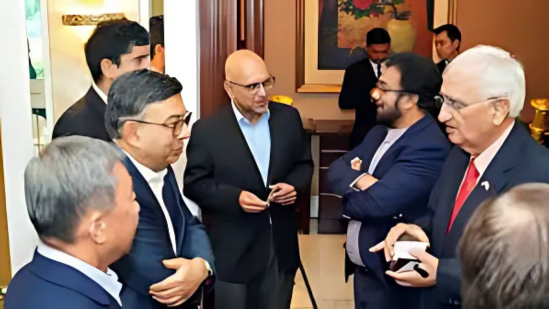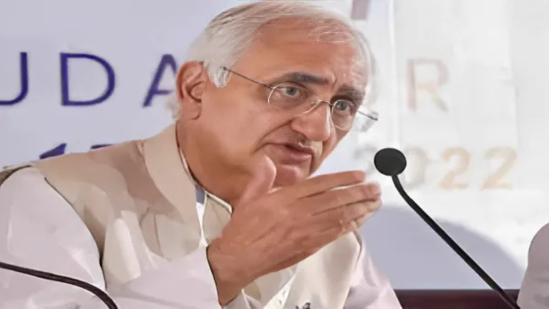
In a surprising turn of events, senior Congress leader Salman Khurshid has come forward to support the abrogation of Article 370, calling the Kashmir issue a “major problem” that needed resolution. Khurshid’s statement has generated a strong response from political analysts, party members, and the general public. His support for a decision led by the Narendra Modi government has raised questions about internal disagreements within the Congress party and a possible shift in political attitudes towards Kashmir’s special status.
What is Article 370 and Why is it Important?
Article 370 was a special provision added to the Indian Constitution after Independence in 1947. It granted the former state of Jammu and Kashmir a special autonomous status. Under this provision, Jammu and Kashmir had its own Constitution, separate flag, and the power to make laws independently on all matters except defense, foreign affairs, finance, and communications.
This special status was initially introduced as a temporary provision, aimed at facilitating Jammu and Kashmir’s accession to India. However, over time, many people and political parties began to argue that Article 370 had become an obstacle to full integration of the state into the Indian Union. Critics claimed it led to separatism, lack of development, and legal isolation of the region.
Abrogation of Article 370 in 2019
On August 5, 2019, the Government of India made a historic move by abrogating Article 370 and bifurcating the state of Jammu and Kashmir into two Union Territories—Jammu & Kashmir and Ladakh. This bold step was announced by Home Minister Amit Shah in Parliament and was immediately implemented by the Narendra Modi-led BJP government.
The government justified its move by stating that removing Article 370 would lead to greater integration, development, and equal rights for people living in Jammu and Kashmir. According to the central government, it was essential to bring the region on par with the rest of India and put an end to decades of violence, corruption, and political instability.
Congress Party’s Opposition to Article 370 Removal
The Congress party, along with several opposition parties, had strongly opposed the move. Congress leaders like Rahul Gandhi and Ghulam Nabi Azad criticized the lack of consultation with local stakeholders and condemned the manner in which the decision was executed. Critics pointed to the imposition of curfews, internet shutdowns, and house arrests of regional leaders as signs of a draconian crackdown on democracy.
For years, the Congress maintained that any change in Jammu and Kashmir’s status should be made only with the consent of the people and elected representatives of the state. Therefore, Salman Khurshid’s public support for the abrogation of Article 370 came as a shock to many political observers.
Salman Khurshid’s Statement Sparks Debate
In a recent interview, Salman Khurshid, who is a veteran Congress politician, former External Affairs Minister, and a respected legal scholar, said that Kashmir had long been a major problem for India. He stated:
“Kashmir was a serious issue for national integration. Article 370 caused confusion in governance and created a feeling of separation. The abrogation helped in solving many of those problems.”
He further emphasized that while there may be party-level disagreements, some decisions are important for the greater national interest. According to Khurshid, it is essential to recognize when a policy helps strengthen national unity and brings long-term benefits.
How the BJP Responded to Khurshid’s Comments
Leaders of the Bharatiya Janata Party (BJP) quickly responded to Salman Khurshid’s statement with appreciation and approval. Union Minister Kiren Rijiju remarked:
“It is encouraging to see opposition leaders acknowledging the right decisions taken by the government. This shows that the truth cannot be denied for long.”
Other BJP members echoed this sentiment, stating that Khurshid’s comments validate the BJP’s long-standing position that removing Article 370 was the right move for the nation.
Silence from Congress Leadership
While Khurshid’s statement gained wide attention, the Congress high command has largely remained silent. Some senior party members have chosen not to react, possibly to avoid internal conflict or public embarrassment. However, political experts believe this silence reflects an uncomfortable truth—that there may be ideological differences within the party on key national issues.
Whether the Congress will address Khurshid’s remarks openly or not remains to be seen. But the fact that such a senior leader has taken a stand contrary to the official party line indicates a growing need for internal dialogue.
Changes in Kashmir After Article 370
The central government has claimed several positive outcomes after the abrogation of Article 370:
- Reduced terrorism: According to officials, the number of terror attacks has dropped significantly, and security forces have better control over the region.
- Improved development: New infrastructure projects, including roads, schools, and hospitals, have been launched.
- Equal rights: Central laws are now applicable in Jammu and Kashmir, including laws that protect the rights of women, children, and Scheduled Castes and Tribes.
- Investment boost: Several industrialists have shown interest in investing in the region.
- Local governance: Panchayat elections and urban body polls were conducted, allowing greater public participation in governance.
However, critics argue that while statistics show improvement, the situation on the ground is still fragile. Many locals in the Kashmir Valley continue to live in an atmosphere of fear, and political leaders have not been given full freedom to operate.
Mixed Public Opinion in Jammu and Kashmir
Reactions among the citizens of Jammu and Kashmir remain divided. In Jammu and Ladakh, many people welcomed the move, hoping for better economic opportunities and integration. In contrast, many in the Kashmir Valley still feel hurt and ignored.
Several residents argue that the central government should have engaged with the people before taking such a significant step. Others, especially the youth, are cautiously hopeful that development and peace will eventually reach their region.
Salman Khurshid’s Broader Message
By supporting the removal of Article 370, Salman Khurshid may be trying to send a broader message—that national unity and stability should come before party politics. Known for his legal acumen and experience, Khurshid appears to be putting the country’s interest first, even if it means going against the party’s earlier stance.
His statement could encourage other opposition leaders to re-examine their positions and engage in constructive discussions on sensitive issues like Kashmir.
Impact on Indian Politics
Khurshid’s remarks may have a lasting impact on Indian politics, especially as the country prepares for upcoming general and state elections. The Kashmir issue has always been an emotional and political matter for Indian voters. If leaders across parties start acknowledging the benefits of Article 370 abrogation, it could shift the electoral debate from “was it right?” to “how do we make it work better?”
What Lies Ahead
Going forward, the real challenge lies in ensuring that peace, development, and democracy continue to grow in Jammu and Kashmir. While security forces maintain order, there is a need for trust-building measures, open dialogue, and economic revival to truly heal the region.
Political parties must also reflect on how to balance regional sentiments with national interest, especially when dealing with historical and constitutional matters.
The statement made by Salman Khurshid in support of Article 370 abrogation marks a significant moment in Indian political discourse. His words carry weight, not just because of his stature in the Congress party, but because they show that views on national issues can evolve over time.
While Congress may not change its official position right away, such statements open the door for internal reflection and mature discussion on matters of national importance. In the long run, Kashmir’s peace and progress will depend on how all stakeholders—political leaders, civil society, and the people themselves—work together towards a unified and inclusive India.































